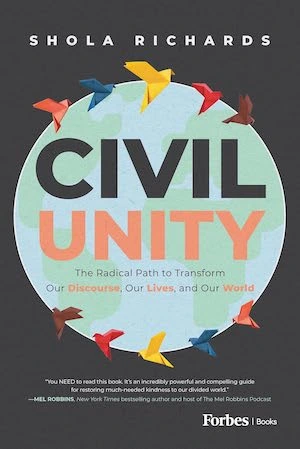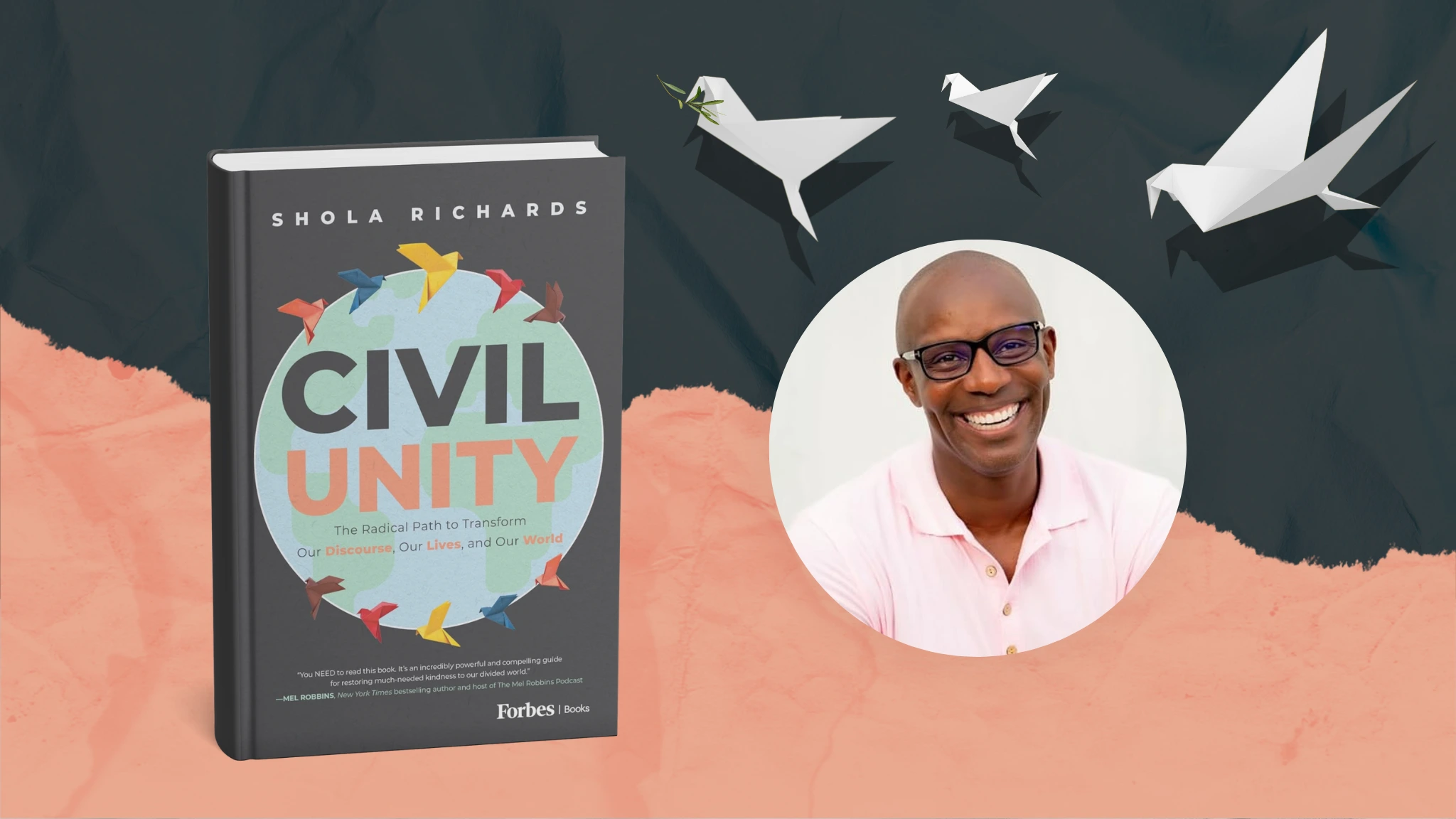Civil Unity: The Radical Path to Transform Our Discourse, Our Lives, and Our World by Shola Richards
“In our extremely divided world where people are unwilling to share space with — much less talk to — people with differing views, it is a radical act to encourage the energetic debating of ideas respectfully and without personal attacks.”
That is one of the thoughts at the heart of Shola Richards’ intriguing book Civil Unity: The Radical Path to Transform Our Discourse, Our Lives, and Our World. Richards, an international civility consultant and keynote speaker, believes that unifying our world around the power of civility is indeed a radical act, and not for the faint of heart.
In this recent interview, Richards elaborates on this fascinating concept.
Q: Why did you write this book?
A: I was exhausted and saddened by society’s disturbing descent into mean-spirited behavior, thoughtlessness and incivility. Personally speaking, not only is it negatively affecting my personal relationships, but it’s also affecting my professional life, my children and my overall mental health. After talking to tens of thousands of people from all over the globe as a keynote speaker, it was clear that most felt the same way, but they didn’t know what to do about it. That was the inspiration for me to write a deeply practical guide on how to bring civility back to our discourse, our lives and our world.
Q: In your book, you advocate for a radical form of civility. Can you elaborate on what makes this approach different from traditional concepts of civility?
A: Traditional ideas about civility seem to focus on leveraging politeness to reduce conflict. It could be as simple as avoiding polarizing issues in hopes of keeping the peace, or worse, weakly lowering our heads when confronted with the policies and the people who are trying to harm us and our loved ones. In both cases, politeness is prioritized to an unhealthy extreme that ultimately serves no one. The civility that I’m advocating for embraces healthy conflict by disagreeing without disrespect.
Q: How do you suggest people navigate the fine line between standing firm on their values and engaging in civil discourse, especially when those values are under direct threat?
A: I have two ideas about this. First, I believe we should check-in with ourselves and ask “why do I believe in this idea so strongly? Is it possible that I could be wrong about it being under direct threat? Am I willing to change my mind about this belief if presented with new facts or information?” Sadly, many people adopt the beliefs of cable news anchors and social media influencers without doing the hard work of critically examining their beliefs and values on their own.
Secondly, and equally as important, if we have done that hard work and we still believe that our values are under attack, then yes, we should factually, passionately and respectfully defend those values.
Q: You address the challenge of maintaining civility with individuals who have deeply hurt us. Can you share an example where practicing civility led to a transformative outcome?
A: Over 20 years ago, I worked in an extremely toxic work environment that wreaked havoc on my mental health and eventually led to my suicide attempt. Thankfully, the people who made that workplace a living hell are no longer a part of my life, and I hope I never see them again. Contrary to popular belief, civility (or at least, my reimagining of it) doesn’t require us to offer kindness, love or even respect to the people who have deeply harmed us. In my example, I’ve maintained civility by intentionally cutting these people (and others like them) from my life, and the peace of mind that it has given me has been transformative.
Q: In a world where social media often amplifies divisiveness, what do you recommend for promoting civil discourse online?
A: One thing that amplifies divisiveness on social media is the spreading of misinformation and disinformation. Practicing the habit of critically examining information before sharing it can prove very helpful, as well as remembering that just because a piece of content aligns with our beliefs doesn’t mean that it’s true.
Secondly, resist the urge to attack others online for their beliefs, because doing so only accomplishes three things: 1) the person being attacked will double-down on their troublesome beliefs, 2) we’ve reduced the chance of that person seeing the merits of our position, and 3) we’re adding to the toxicity on social media that we claim to hate. With unproductive social media conflict, sometimes the best strategy is not to engage.
Q: How can leaders in organizations foster a culture of civility while still encouraging honest and sometimes difficult conversations?
A: First, if a leader is unwilling to communicate honestly, transparently and with civility, any effort to get their team to do the same will fall flat. More important, the workplace is one of the last places remaining on earth where we are forced to spend an extended amount of time with our ideological opposites.
While many leaders fear the challenge of polarizing topics creeping into the workplace, I feel that this could offer a unique opportunity to practice having civil and respectful discussions about challenging topics when they arise, while staying professional. It’s naïve to expect the workplace to be a polarizing issue-free zone, so leaders must ensure if, or when, these issues are discussed, it’s done with civility.
Q: Mental health is a key aspect of your vision for a civil world. How do you see the practice of civility contributing to overall mental wellness, both on an individual and societal level?
A: On an individual basis, increasing the amount of respect and kindness in our everyday interactions will help to reduce the stress and anxiety that can come from consistently dealing with toxic conflict. If we can do this on a larger scale, then societally, we’ll be able to enjoy working in organizations with healthy cultures, our kids can learn in kinder schools free from bullying, and we could even enjoy less toxicity in our politics. Civility is contagious, and I believe that if more people embrace it, not only will it improve our collective mental health, but it could also change the world.
Q: In situations where one party refuses to engage in civil discourse, what steps can be taken to prevent further polarization without compromising on important issues?
A: If someone tries to reduce the conversation to personal attacks and insults, then there’s no reason to engage any further. Of course, this is easier if it’s someone who you don’t know or respect, but the same applies to a colleague, friend or loved one. Simply put up a boundary that could be as simple as saying, “I’m happy to discuss this topic with you, but if you continue to call me names and insult me, then I’m going to end this conversation now.” A large part of civil discourse is challenging others to disagree without disrespect, and if they can’t summon the impulse control to do so, then you have every right to walk away.

Publish Date: September 24, 2024
Genre: Business, Self Help
Author: Shola Richards
Page Count: 288 pages
Publisher: ForbesBooks
ISBN: 9798887504896
Read the original article here




